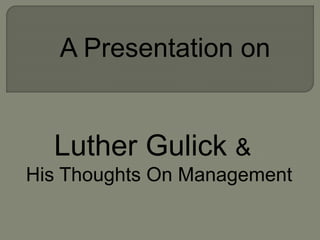
Luther Gulick
- 1. A Presentation on Luther Gulick & His Thoughts On Management
- 2. NAME REGISTRATION NO. 1. Farzana Salsabil 2013237067 2. Mahbuba Rumi 2013237070 3. Ruma Begum 2013237056 4. Abdul Mutalib 2013237029 5. Imran Ahmad Chowdhury 2013237081 6. Anuj Chowdhury 2013237076 7. Jakaria Ahmed 2013237053 8. MD. Mutabbir Hossain 2013237027
- 3. Born: January 17, 1892 Osaka, Japan Died: January 10, 1993 Luther Gulick
- 4. The objectives of the study to know about- Luther Gulick’s life & time Gulick’s principles on management Gulick’s theory of Organization POSDCORB Function on management Criticism ‘s of Gulick’s Theories and POSDCORB view
- 5. Luther Gulick entered Oberline’s preporatory school at the age of 14 1914- Graduated from Oberline college 1920- Ph.D from Columbia University 1939- Secured Litt.D 1954- Conferred LL.D
- 6. 1914: Served National Defence Council. 1931-1942: Professor of Columbia University. 1936-1938: President’s committee on Administrative Management. 1921-1962: President of Institution of Public Administration. 1954-1956: City Administrator of New York city.
- 7. Evolution Of The Budget In Massachusetts (1920) Administrative Reflections from world war II (1948) American Foreign Policy (1951) Papers On The Science Of Administration “Notes On The Theory Of Organization”(1937)
- 8. Henry fayol: Administrative Management Theory F.W Taylor: Machine Model of Man.
- 9. * Task are highly dissimilar * Need improvements to administrative structures and methods. * Organizational designed should be guided by the line -staff principle * Organizations are unorganized. * Have no design for control.
- 10. 1. Division of work on specialization. 2. Departmental organization. 3. Co-ordination through Hierarchy. 4. Co-ordination through committers. 5. Delegation. 6. Deliberate co-ordination. 7. Decentralization. 8. Unity of command. 9. Line and staff. 10. Span of control.
- 11. THEORIES OF GULICK Departmentalization POSDCORB Co- ordination Division Of Work
- 12. In Departmentalization theory, Gulick Identifies four department-
- 13. The Theory of Departmentalization are criticized on the basis that- 1. They are incompatible with each other. 2. They are overlap between them. 3. They are also vague. 4. Are perspective rather than descriptive.
- 14. HUMAN NATURE TIME SPACE Division Of Work
- 15. 1. The volume of work involve in man-hours. 2. The technology and custom at a given time and place. 3. The subdivision of work must not pass beyond physical division into organic division
- 16. Co-ordination of work can be achieved in two ways- 1. By organization 2. By dominance of an idea
- 17. > Define the job to be done. > Provide a director to see that the objective in realized. > Determine the nature and number of individualized and specialized work units. > Establish and perfect the structure of authority
- 18. Gulick notes that the number of subordinates that can be handled by a manager depend on- > Organizational stability > The specialization of the subordinate > Space
- 19. Gulick has emphasized the theory of unit of command that- > Each worker should only have one direct superior. > To avoid confusion and inefficiency.
- 20. In 1935, Luther Gulick formulated POSDCORB,
- 21. > Planning: Outline the things need to be done. > Organizing: Establishment of the formal structure and authority. > Staffing: Training the staff and maintaining favorable conditions of work. > Directing: Giving orders and instructions to control the subordinates. > Coordinating: Duty of interlating the various parts of the work. > Reporting: Informig the authority what is going on. > Budgeting: Form of fiscal planning, accounting and control.
- 22. Public administration scholars such as Robert Dahl, Dwight Waldo and Herbert A. Simon released articles and books criticizing POSDCORB. > Simon states that the POSDCORB principles are- 1. Oversimplification of administration 2. Vagueness and ambiguities involved in applying this principle in a real world setting in specialization principles. 3. The principle unity of command is contradicts the principle of specialization.
- 23. 1. Administrative Thinkers edited by D. Ravindra Prasad, V. Sivalinga 2. Organizational Theory And Public Management- Jonathan R. Tompkins 3. Notes on the theory Organization- Luther Gulick. (1937) 4. Papers on the science of Administration- Luther Gulick & Lyndall Urwick 5. Publicadministrationtheone.blogspot.com 6. Wikipedia
